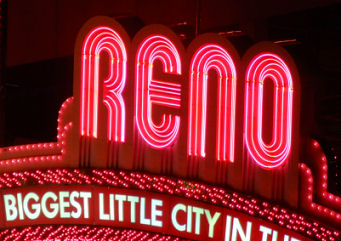 Last week in Reno, Nevada, +100 leaders from the worlds of Business, Government, and the Community Benefit sector convened at UNR’s beautiful new Student Union building, to ask and answer, “What will it take to make families in Northern Nevada financially stable?”
Last week in Reno, Nevada, +100 leaders from the worlds of Business, Government, and the Community Benefit sector convened at UNR’s beautiful new Student Union building, to ask and answer, “What will it take to make families in Northern Nevada financially stable?”
I was blessed to be their facilitator. Blessed because it was a shining example of the subtitle to The Pollyanna Principles: Why Nonprofits Have Not Changed the World and How They Can. And blessed because I got to guide a room-full of passionate people to find their power – the power to create an extraordinary future for their community.
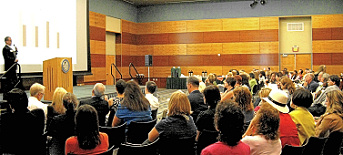
The day began with the Federal Reserve Bank’s John Olson sharing statistics about the economy’s effects. Then Jill Perry from Reno’s Consumer Credit Counseling Service took the stage, transforming those statistics into stories of real people – not those traditionally considered “poor,” but those who thought they had life in order, only to find the walls crashing in. It was a sobering start to the day.
From there, it was our turn.
Knowing the overwhelmingly bad news that had comprised the Summit’s first hour, and knowing that community leaders tend to simultaneously distrust and gravitate towards quick solutions (a quandary, indeed!) – well, you can imagine the challenge we faced!
And so we started out as we do in rooms like these across the country. We guided the group to move toward the future they DO want, rather than staying mired in what is making today so difficult. We reminded them that the future is a blank slate, just waiting for them to make their mark.
Then we held our breath, and we dove in.
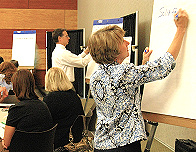
What is Financial Security?
With 100 people in the room, it was likely there were 100 different images of what it might look like if a family were financially stable. If we were all aiming at a different image of success, it would be pretty tough to chart a course to get there!
And so, to get everyone on the same page, the group was asked to describe what life would look like if a real family – the Medina Family – was financially secure.
I wish I could tell you, “They all loved the exercise!” but you would know I am lying.
Yes, most participants enjoyed the call to stretch their brains. Others, though, tolerated the work only because I assured them we would end up with clearly defined short-term goals by the end of the day. To their credit, everyone participated, although I know some would have preferred going straight from statistics to short-term goals.
But that was not what this day was about.
What Will Produce Financial Security?
From their definition of “success,” we then asked the group to march backwards through the cause-and-effect of time. Again, the “silly exercise” alarm went off, until I explained, “We humans plan most of our lives by working backwards. Just try figuring out what time you need to wake up if you want to be at the airport on time, and you’ll see that we work backwards all the time.”
Then I asked,
Why is it, then, that the only place we do NOT plan backwards is in “strategic” planning for our organizations and our communities?
And so the group dove in to determine what cause-and-effect community conditions would lead to the Medina Family being financially secure. What would the community need to have and be?

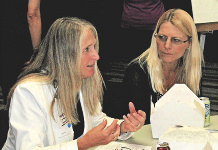 This is where all the data provided by John Olson from the Federal Reserve Bank, and Jill Perry from Consumer Credit Counseling fit in to flesh out the group’s thinking. (And it was great to have both of them stick around to participate in the day’s events, after their morning talks!)
This is where all the data provided by John Olson from the Federal Reserve Bank, and Jill Perry from Consumer Credit Counseling fit in to flesh out the group’s thinking. (And it was great to have both of them stick around to participate in the day’s events, after their morning talks!)
The groups filled sheets with community conditions – some conditions related to finance, and far more related to other issues entirely.
Time to Reflect
In wrapping up that question, we asked the groups to pause. “What stood out for you in these discussions?” Busy people are rarely encouraged to reflect and learn together. That was made clear to me during the work we did last month to create the Institute’s Consultant Curriculum (thank you, gang!), and it became clear again during this Summit.
Imagine a group of high-powered community leaders, being asked to stop their work and take a moment to publicly reflect about the very process they were going through! Oh, the agony! While many of the attendees indeed reveled in those discussions, just as many rolled their eyes. “Oh geez – can’t we please just get on with it already?”
And again to their credit, they shared and they listened. The most common theme was that “real everyday people” were not in the room, and yet this was all about them. Another theme had to do with the layers of assumptions we all tend to make about those who need help. These observations would strongly influence the work that remained to be done.
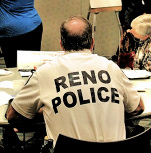
And then, after everyone else had shared their thoughts, Reno Police Officer Patrick O’Bryan took the microphone. Suddenly, even those who were not entirely at ease sharing their observations were waiting to hear from this uniformed officer, firearm holstered at his hip.
Officer O’Bryan uttered just three words:
“Are you comfortable?”
He then paused for what felt like forever, looking around the room. Finally, he continued,
“Because if you’re comfortable, then nothing will change. To change our community, we need to step outside our comfort zone. So are we willing to be uncomfortable?”
The room lit up. Skepticism melted away. The entire group was suddenly ready to take steps to create the future they had envisioned.
Creating the Future in Small, Doable Bites
The rest of the day was spent energetically tackling the “doing” part. Consolidating the “community conditions” they had listed into major themes, individuals gathered according to the theme they wanted to work on.
Education, healthcare, financial matters, basic needs, jobs – one might expect those themes to arise at a Summit on Family Financial Security.
But then there were themes that spoke of a different kind of stability. Quality of Life. Emotional and Spiritual Health. Community connectedness. Even the issue of Tax Reform, a huge hot potato in a state that prides itself on its low low taxes (sounds like a Crazy Eddy stereo commercial, doesn’t it?) – but the group acknowledged “taxes” as an issue that must be addressed if the conditions in communities are to improve.
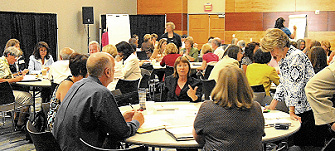
For the group, the best part was this:
By the end of the day, they had taken ownership of those issues, and were taking first steps towards creating a better future for the people of Northern Nevada. By the next morning, one group had already reserved the Washoe County Commissioners Chambers as a meeting place for further discussion and presentations.
And the best part for us?
Watching skeptics become believers. At the end of the day, one of the leaders from the business community thanked us. “I confess I did not enjoy our work this morning. But seeing where we have ended up… well, that is really the only place we could have started. We would not have gotten anywhere close to where we are this afternoon had we not begun right where you started us.”
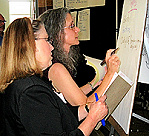
Same? Different?
When our client, the wise and patient United Way CEO Karen Barsell, asked us what was the same / different from similar events we have facilitated, we had to confess the day had gone pretty much as these days go for us. That is to say, extraordinary.
First, magic happened, and we routinely see magic happen during these events. People convene, they share their passions, they create a path to the future, and they dive in to begin making that path real. The energy in the room is always enough to power a small city, because we are moving beyond “eliminating a negative,” and aiming at “creating something positive.”
What else? Skeptics became believers, like the business leader who approached us after the day was done. That, too, happens every time.
And then there was the fact that themes seemingly unrelated to the narrow focus of the event (financial stability) were enthusiastically pursued as relevant. That, too, happens every time. Issues of the spirit, of community connectedness, of political influence – all those issues are embraced when folks are encouraged to explore what it will really take to create change.
And then there was Officer O’Bryan. Even his influence occurs in more sessions than not. In Michigan several years ago, it was the fund development officer for a major university, using almost the exact same words. “We are all going to be uncomfortable for a while if we are going to create serious community change. Are we willing to do so?” In other locales it has been a highly visible foundation officer – someone with clout, who steps up to defuse the skeptics. And that, too, happens too often to be a coincidence.
My Own Reflection
Every time I facilitate a session like this, it reinforces for me Why Nonprofits Have Not Changed the World and How They Can.
It reinforces that the reason has not been what Community Benefit Organizations have done, but how we think. When we focus on today’s horrors, that is where we stay. But when we tether our work to the future we want to create, that is what we hold ourselves accountable for accomplishing.
Changing how we think changes what we do. In turn, that changes what we accomplish.
When we think it is impossible to create social change, we do not even try. But when we change our expectations – realizing that if something is not scientifically impossible, it is possible – the work we do follows suit.
When we do our work as individuals, we create quick goals and move on. But when we are encouraged to share the wisdom of others, we quickly realize that, in the words of my brilliant colleague, Jim Ulrich of Duquesne University, “It takes a village to raise a village.” Connection makes everything more doable, more possible.
When we examine the assumptions and expectations that have created the world we live in today, we see not only Why Nonprofits Have Not Changed the World, but more importantly, How They Can.
For the work of this sector, the happy ending is a world that is far better than this one. When that is the end result we expect, creating that happy ending becomes as simple as creating the cause-and-effect path to that future. From there, we just need to start walking.
Last week, in Reno, Nevada, Dimitri and I joined 100 community leaders who took their first steps along that path.
Will your community be next?
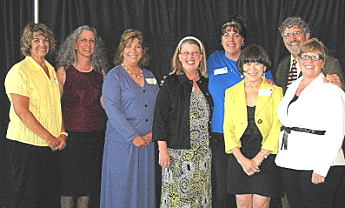
Many thanks to Karen Barsell of United Way of Northern Nevada, for asking me to be part of this wonderful effort, and to the amazing staff at United Way, for making us feel so at home. Huge thanks to the volunteer facilitators who made my work easy after only 90 minutes of trial-by-fire training the day before. Thanks to Reno’s business community and their County Commissioners, for seeing the need for this event, for sponsoring it with funds, and supporting it with your enthusiasm. Thanks to Vivienne French and Chris Askin, without whom I would not have met Karen last November. And as always, thanks to my friend Jill Berryman of Sierra Arts Foundation, for introducing me to Reno years ago, and for encouraging the community to embrace our work. You are all very special to Dimitri and me, and we cannot wait to come back!

The July 24, 2008 Family Financial Security Summit was hard work. The stage was set with presentations about economic conditions in northern Nevada. With this information in mind, the participants began to work in groups for the remainder of the day.
Are you like me? Do you leave a day-long working meeting and wonder if anything will really happen after you’ve put so much energy into it and the day is over? After a week has passed by, will any of the groups actually start working together?
I am pleased to report the answer is YES!
I saw some of the participants meeting this week in our office to further the discussion they started at the Summit about “Community Connectedness”.
And the “Asset Development, Financial Literacy and Savings” group is working to invite Summit participants to come to a meeting in September for presentations from representatives from very successful programs in other communities in our region that have demonstrated measurable results to help create “Financial Stability”.
My observation of week one… It is amazing to see community engagement in action!
A BIG THANK YOU goes to Hildy for staying the course with us to get these efforts in motion. It’s working!
Oh Karen, that is the best news EVER!
🙂
Hildy
Congratulations, Karen! To you, your staff, and all the people participating in the forum. The question Officer O’Bryan asked the group was very compelling. And it sounds like it further engaged participants in their day’s work.
With your leadership, and that of your board, staff and the community you are making the ‘connections’ and identifying the connections that need to be made. Changing the world is a daunting task, but the first step is knowing you can.
Thanks for the e-mail. I would be interested in attending the next meeting on Family Financial Stability in September so please keep me posted. We are planning on getting a program going at Reno-Sparks Indian Colony.
I would recommend you invite Dean Hankey (800)357-7469 ([email protected]) He has facilitated Dave Ramsey’s “Financial Peace University” at several churches in Reno for a number of years. Hundreds of people have attended this 13-week workshop and it has changed their lives and family finances – a great program!
Another good program is the Boys & Girls Club “Weed & Seed” personal finance workshops. The contact is Daphne Shaw at 331-3566.
Good point about the question “are you comfortable”. With this financial downturn, a lot more people are uncomfortable, and that may motivate some change.